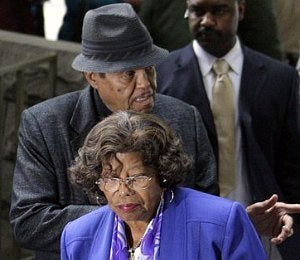

The second week in the hearing to determine if Michael Jackson’s physician, Conrad Murray, should stand trial for involuntary manslaughter resumed on Monday in Los Angeles. Several members of the Jackson family were in attendance, including sisters Janet, LaToya and Rebbie. mother, Katherine, and brothers Jackie and Randy were also in the courtroom. Another sibling, Jermaine, 56, is in Burkina Faso, Africa because U.S. officials will not renew his passport until he pays two-year’s worth of child support to Alejandra Genevieve Oaziaza, the mother of his two children.
When court adjourned last Friday, Murray’s personal life was put in the spotlight as three women in his life — past and present — testified about the doctor’s behavior the day Jackson died.
Additional questions were also raised on Friday as a result of a testimony by Elissa Fleak, a county coroner’s office investigator. According to Fleak, 12 vials of propofol, a powerful anesthetic used for surgery, were found in Jackson’s house days after he died; some of them already opened. In fact, Fleak said she found an empty bottle of propofol on the floor near Jackson’s bed shortly after he died on June 25, 2009.
At the request of police, Fleak returned to the estate four days later and searched a closet, which she described as the size of a “normal” bedroom. There she found 11 more vials of propofol — two were in a zippered, dark blue bag and the other nine were discovered in a light blue and brown bag marked “Baby Essentials.” That bag also contained Murray’s business cards.
On Monday a pharmacist at Applied Pharmacy Services in Las Vegas, Tim Lopez, testified that beginning on April 6, 2009, Murray began ordering large quantities of propofol. By June 10, 2009, a total of 255 vials of the drug were ordered. The coroner’s office has concluded that Jackson died of acute propofol intoxication in combination with sedatives.
But did Jackson administer the lethal dose himself? On Friday, Murray’s lawyers hinted at the possibility when they asked Fleak if the IV bag containing propofol was ever fingerprinted. They also asked if it was possible for Jackson to reach the syringes from his bed. Judge Michael Pastor did not allow Fleak to answer the question.
On Monday, Murray’s team pushed that theory even harder by calling LAPD Robbery Homicide Detective Orlando Martinez to the stand regarding an interview he conducted with Murray two days after Jackson died. Martinez said Murray told him he was trying to ween his patient off of propofol the night before Jackson died by giving him a variety of other drugs beginning after 1 a.m. Allegedly Jackson said if he didn’t get to sleep he would cancel his rehearsal for later that day.
Murray, feeling pressure, gave Jackson a reduced dose of propofol — with some help. As TMZ has reported several times, Jackson liked to push in the drug himself. Murray went to the bathroom for two minutes and when he came back, he said the singer had stopped breathing.
In those two minutes did Jackson drink propofol? Murray’s attorney, J. Michael Flanagan, implied it in court on Monday. TMZ reported that Flanagan brought up the 70 grams of fluid found in Jackson’s stomach at the time of the autopsy — fluid that has tested positive for propofol. Flanagan said there was a juice box on the nightstand beside Jackson’s bed and asked a senior criminalist from the LA County Coroner’s Office if that box had been tested for the drug. The coroner said it had not.
As TMZ puts into perspective Flanagan’s line of questioning: He might be suggesting that Jackson was secretly self-administering his propofol, which would support Murray’s defense theory that his patient accidentally caused his own overdose.
